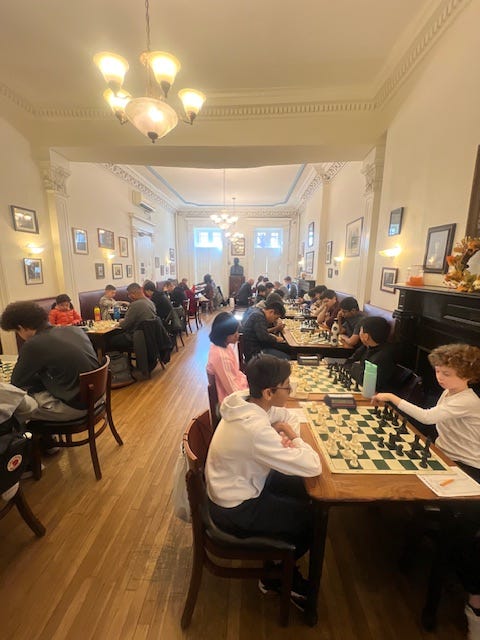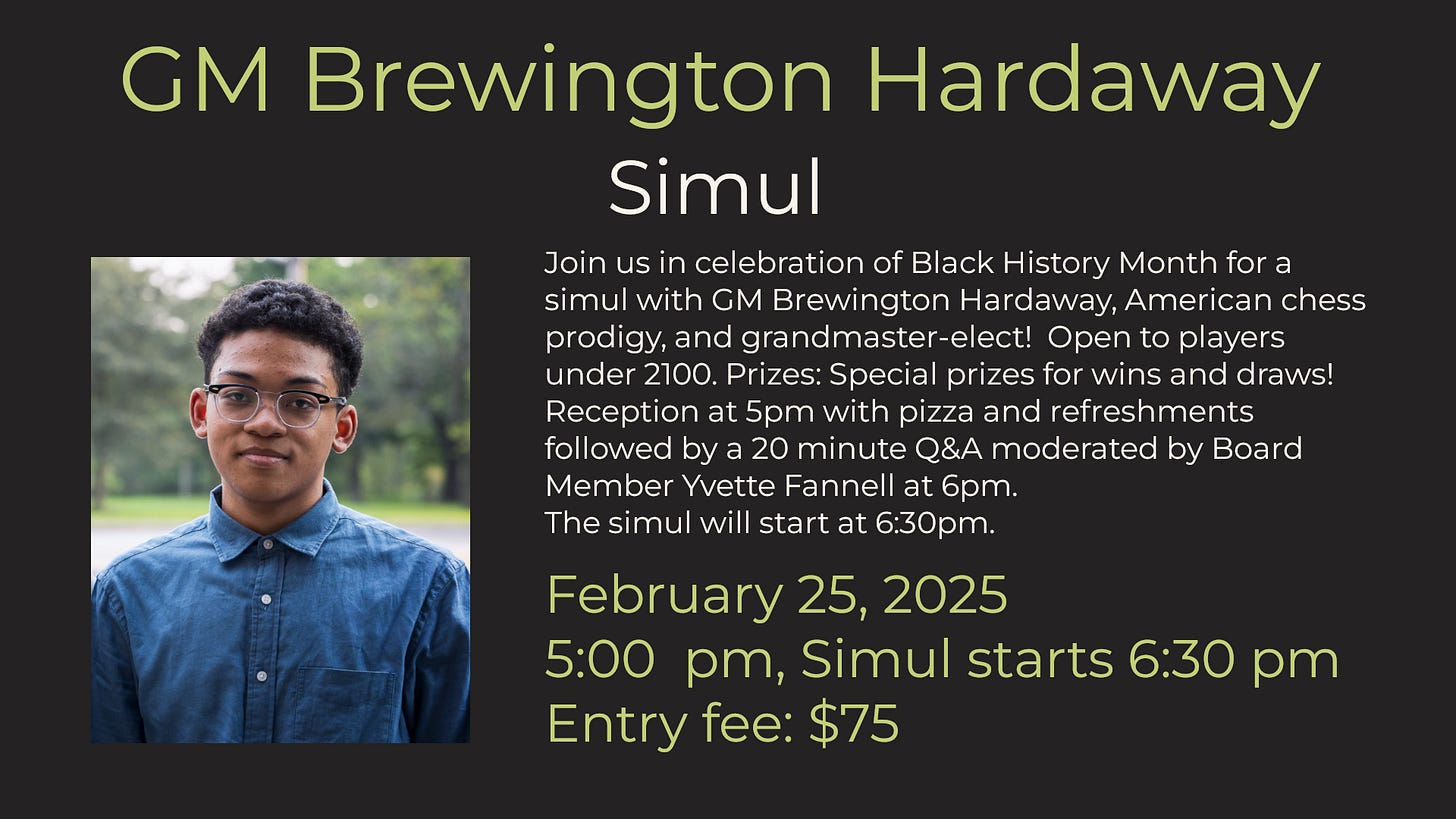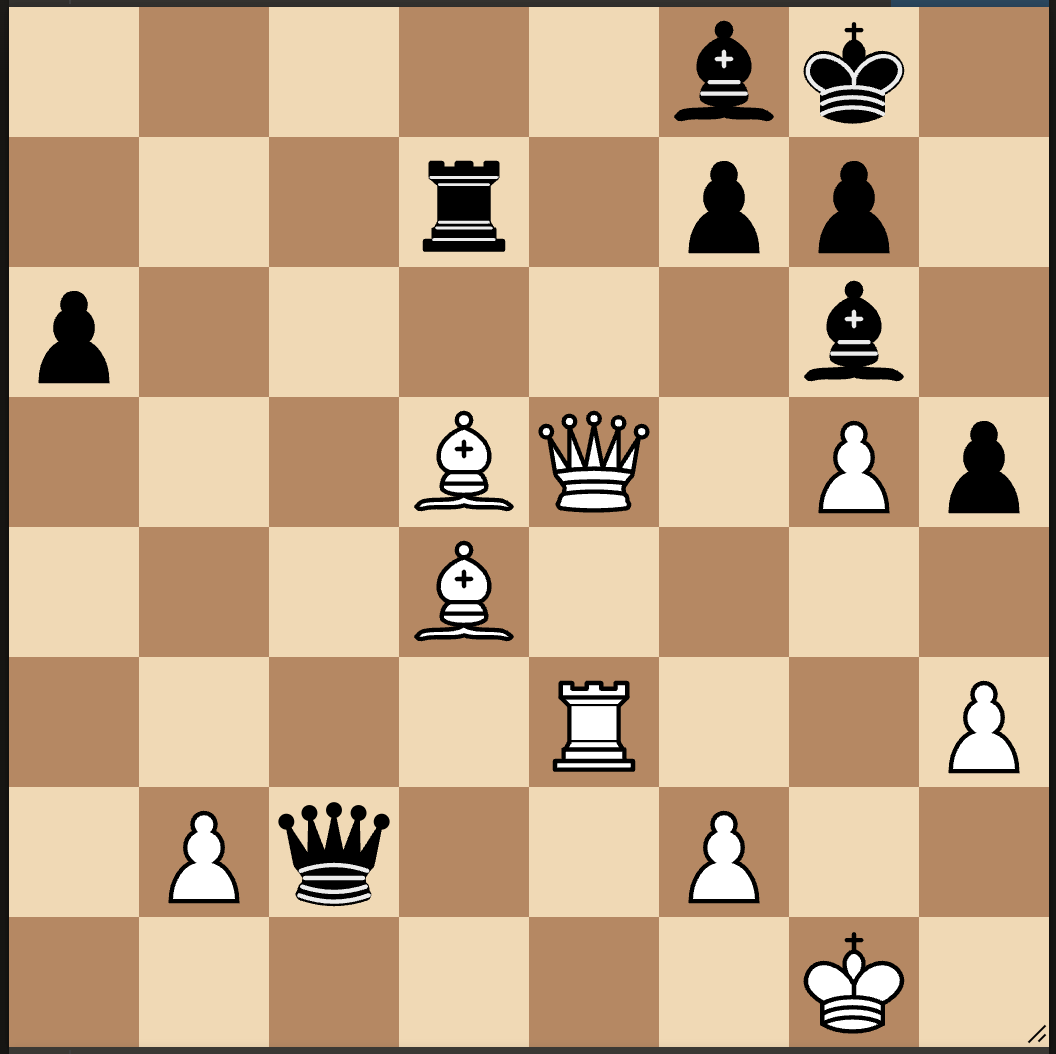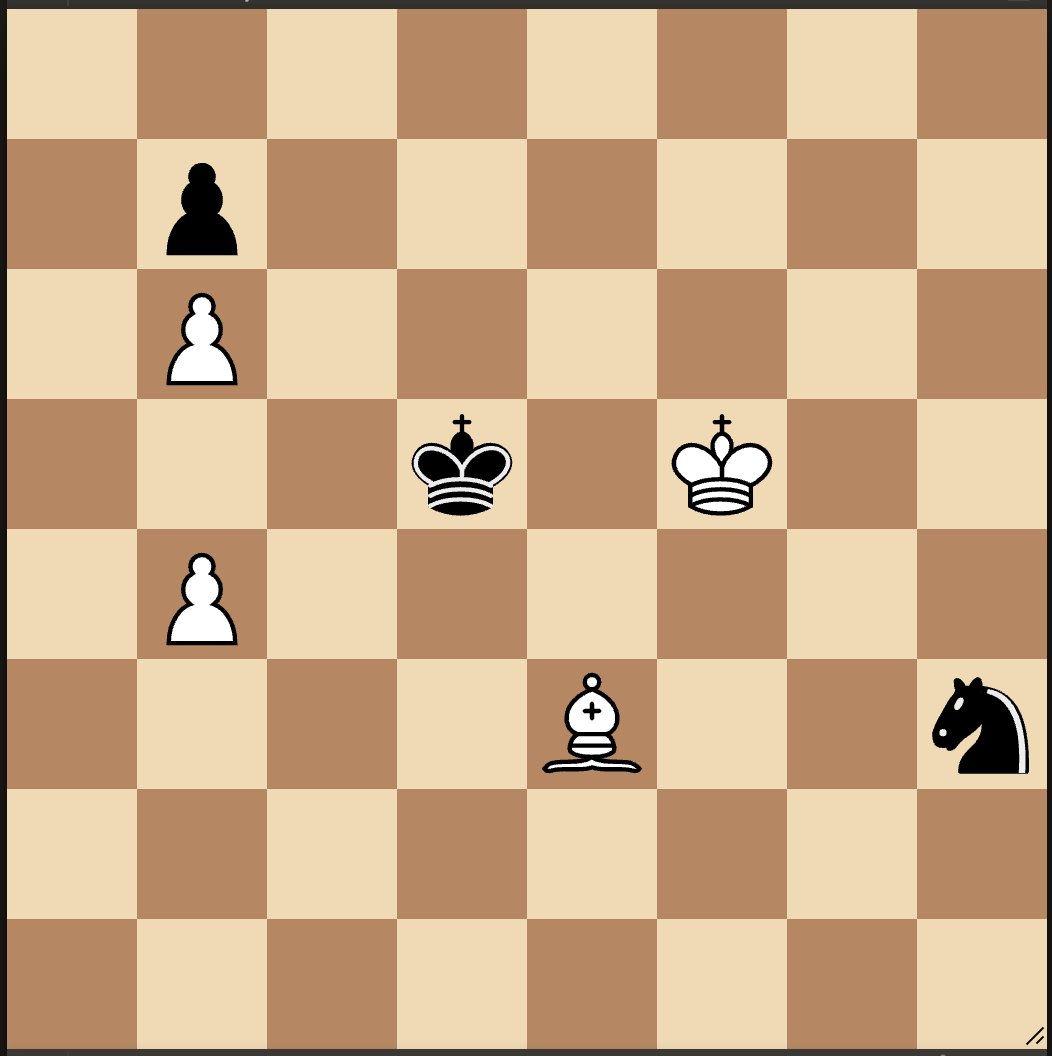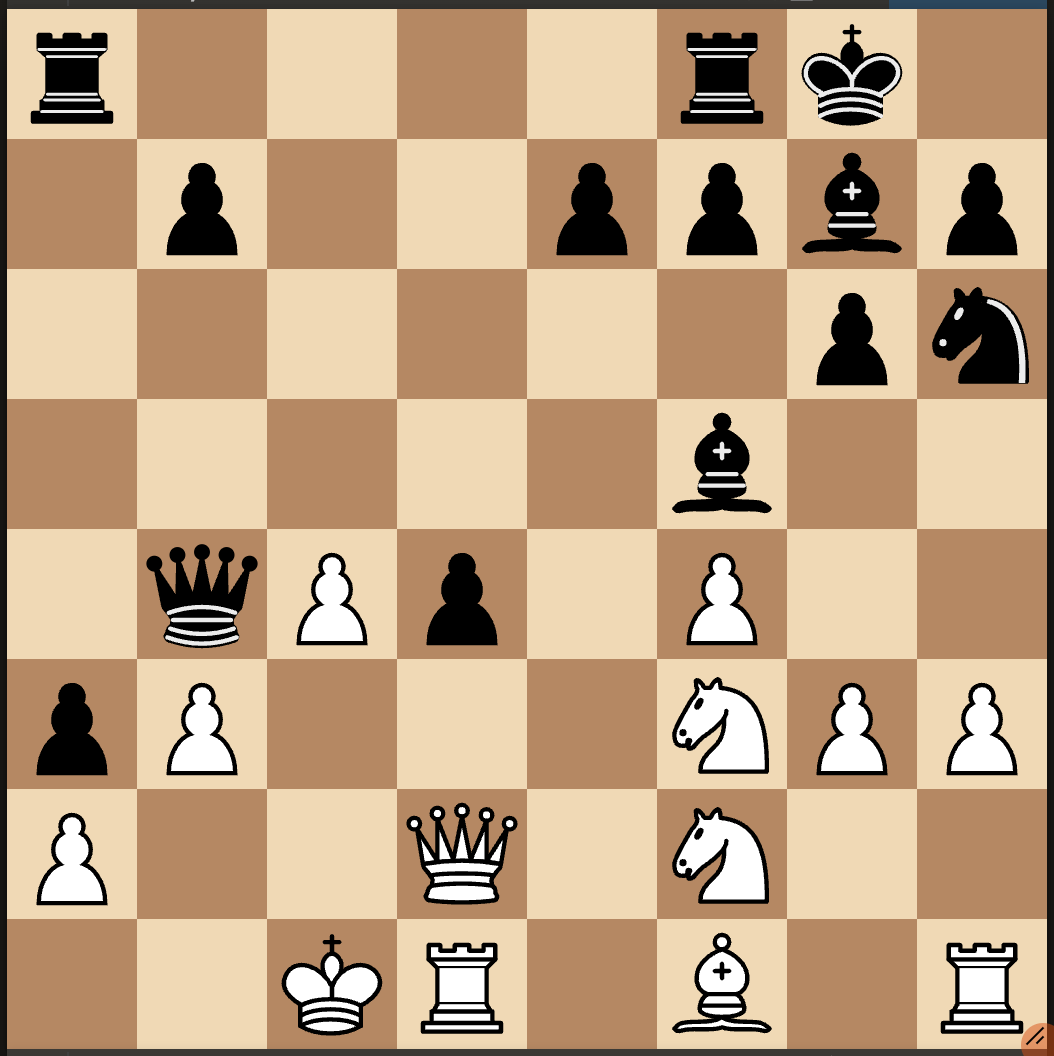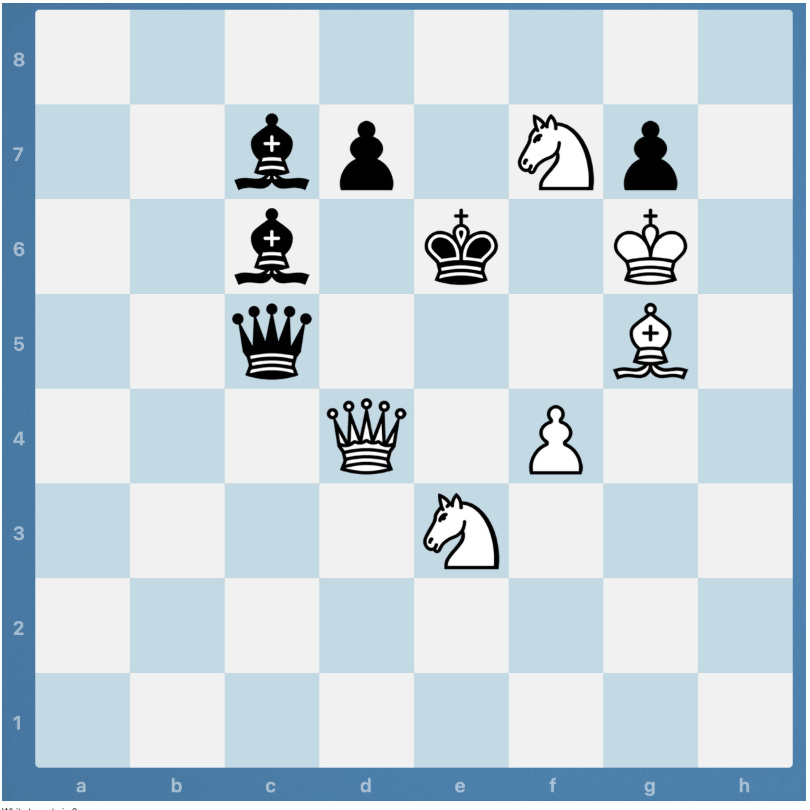In This Issue: From The Skittles Room February FIDE Premier Game Analysis, by GM Aleksandr Lenderman Playing in a FIDE Zonal, by Marshall Member Miles Lee Chess Toons En Passant Problems, Problems, curated by Alexander George Editor's Note
Welcome back, fellow chess players, to this edition of the Marshall Chess Club's fortnightly bulletin, The Marshall Spectator.
This week we had a full club as we celebrated President’s Day by having an action tournament with 51 players registered! It was a 6-round, Game 25 delay 5 tournament featuring many of our most active scholastic players as well as the legendary FM Asa Hoffmann. If you missed it, no worries, we will have another one on Memorial Day and hope to see you then.
Looking ahead, we have a very special guest joining us for a Simul in celebration of Black History Month on February 25. GM Brewington Hardaway will come to our historic club to give a Simul and 20-minute Q&A at 6 pm. There will be pizza and refreshments served.
Further ahead on the calendar, we are looking forward to hosting legendary GM Susan Polgar for an author talk and book signing. The talk will be moderated by IM Rusudan Goletiani and sponsored by the Marshall Chess Foundation.
We are also excited to share with you that summer registrations are open for our summer camps here. In addition to GM Djurabek Khamrakulov, the summer camps will feature GMs Andrei Maksimenko, Alexander Shabalov, and Oliver Barbosa as instructors, with many other guests to be announced!
Looking back over the last two weeks, we have had a plethora of events for our members to play in.
The FIDE Premier Under 2000 that concluded on February 9 had 51 players registered and was won by Lucas Lu, who scored a perfect 5 out of 5 to win the $834 first-place prize. Thomas Holder and Leah Yang scored 4 out of 5 to win $292 each, while Andrew Chan won a $250 class prize for his 2.5 out of 5 score. Finally, Michael Verberkmoes won a $209 class prize for his 1.5 out of 5 performance.
The FIDE Premier Open that concluded on February 9 had 30 players registered and was won by Linxi Zhu, who scored 4.5 out of 5 to win the $747 first-place prize. Alan Hiroshi Morris-Suzuki and IM Jay Bonin both scored 4 out of 5 to win $327 each.
The Rated Beginner Open on February 9 had 35 players and was won by Thomas Moh, Chaitanya Amdekar, and Jack Troast who scored a perfect 3 out of 3 to win $131.67 each.
The Morning Masters on February 8 had 10 players and was won by Daniel Wang and WFM Megan Paragua, who scored 2.5 out of 3 to win $56.50.
The Under 2000 Morning Action on February 8 had 51 players registered and concluded with a 4-way tie. The following players won $149 each for their 3 out of 4 score: Bryson Wolf, John Silva, Kenny T Bollin, Aziz Abdijalilov.
The Thursday Action on February 6 had 34 players registered and finished with the following 5 players winning $64 each for their 3.5 out of 4 score: IM Jay Bonin, Vladimir Bugayev, Kiren Nasta, Joshua Block, and FM Jonathan Subervi. WFM Raydily Rosario and Alec Hyunmook Choi scored 2.5 out of 4 to win $30 each.
The Rated Beginner Open on February 2 had 37 players registered and finished with the following 5 players winning $81 each for their perfect 3 out of 3 score: Thomas Moh, Eric Balkanski, Anderson Antoine, Mila Schultes, and Aidan Young.
The Sunday Game 50 Under 1600 on February 2 had 36 players registered and was won by Ben Davar, who scored a perfect 4 out of 4 to win the $216 first-place prize. Sebastian Goodrich, Jeffrey Ho, and Alex Kostovetsky scored 3.5 out of 4 to win $84 each.
The Sunday Game 50 Open on February 2 had 53 players registered and was won by GM Mark Paragua, who scored a perfect 4 out of 4 to win the $300 first-place prize. GM Michael Rohde and Derek Zhan won $100 each for their 3.5 out of 4 score, while Charles Ho and Theodore Shin won $75 each for their 3 out of 4 performance.
The Under 2000 Morning Action on February 1 had an even 40 players registered and concluded with the following 5 players scoring a perfect 3 out of 3 to win $68.40 each: Zachary Yu, Alec Hyunmook Choi, Anthony Li, Brendan Moran, and Jacob Ehrenkranz. The following 4 players received a class prize of $36.75 each for their 2 out of 3 performance: Roman Rubinstein Mash, Jonathan Hsieh, Hugh Hansard, Jr Verrier, and Leandro G. Almanzar.
The Morning Masters on February 1 had 15 players registered and was won by Lucas Yang who scored a perfect 3 out of 3 to win the $113 first place prize. John Lodger Hughes and Dominic Nathan Paragua scored 2.5 out of 3, winning $37.50 each for their effort.
The Saturday Game 50 Under 1800 on February 1 had 51 players registered and was won by Hudson Wong, who scored a perfect 4 out of 4 to win $282. Ryan Wang won a $141 prize for his 3.5 out of 4 score, while Dhruthi Rao and Chris Weldon won $94 each for their 3.5 out of 4 performance.
The Saturday Game 50 Open on February 1 had 34 players and was won by IM Justin Sarkar who scored 3.5 out of 4 to win the $204 first place prize. Lucas Moina and Jin Ma won a class prize of $51 each for their 3 out of 4 performance, while IM Jay Bonin, Nick Panico and Robert Olsen won $43.33 each for the same score.
We look forward to seeing you at the club soon!
February FIDE Premier Game Analysis, by GM Aleksandr Lenderman
The winner of the tournament was a young rising star, Linxi Zhu. He had a very strong tournament with 4.5/5 (the only half point being a bye), so he won all of his 4 games, including against the higher-rated Aditeya Das.
You can play through the games with analysis here.
February Marshall FIDE Premier, 2025 Round 4: Zhu, Linxi - Das, Aditeya Sicilian Defense: Najdorf Variation, Adams Attack
1. e4 c5 2. Nf3 d6 3. d4 cxd4 4. Nxd4 Nf6 5. Nc3 a6 6. h3 e5 7. Nb3 Be6 8. f4 Nbd7 9. g4 h6 (9... Rc8 Is the main line here 10. f5 Bxb3 11. axb3 d5 12. exd5 Bb4 With sharp play, but maybe slightly favors white.)
10. f5 Bxb3 11. axb3 d5 12. exd5 Bb4 13. Bg2 Here, white got a better version.
13... Qb6 14. Qe2 Qc5 15. Qe3 O-O-O 16. Qxc5+ Nxc5 17. Be3 Nce4 18. Ra4 Nxc3 19. bxc3 Bxc3+ 20. Ke2 Kb8 21. Rd1 Rc8 22. Rc4 (22. d6 Was a bit more accurate.)
22... b5 23. Rc6 Rxc6 24. dxc6 Kc7 25. h4
25…Kc8? (25... e4 { was a must. White is still better but the battle continues.)
26. Bb6 Nxg4 27. Rd7 Bd4 28. Rc7+ Kb8 29. Rb7+ Kc8 30. Bc7 Nf6 31. Bd6 A very strong performance by Linxi here. 1-0
February Marshall FIDE Premier, 2025 Round 5: Morris-Suzuki, Alan H - Zhu, L Sicilian Defense: Closed
We have a dejavu situation compared to Marshall U2400 last month, which I wrote about in the last Marshall Spectator. Last time, Alan also had 4/4, but was stopped by James Marsh, who had 3.5, but overtook him by winning the last round. This time, once again, Alan has 4/4, and this time, is playing against Linxi who has 3.5. This time, there is also, Jay Bonin with 3.5, which gives even more incentives for Linxi to play for a win, even with black, since potentially, if Jay wins, and Linxi draws, 4 points might not get a prize. Also, this time, the big difference is that Linxi is in a must-win game with black, while last time, James Marsh was in a must-win game with white. With Linxi being a great attacking player, this game is bound to be an exciting battle.
1. e4 c5 2. Nc3 d6 3. Nf3 Nf6 4. e5 White deviates from main lines early.
4... dxe5 5. Nxe5 a6 6. g3 Qd6 Black reacts correctly and, most likely, is familiar with the theory.
7. Nf3 Nc6 (7... b5 Perhaps this makes more sense first, and not declare yet where to develop the knight.)
8. Bg2 Bg4 9. d3 e6 10. h3 Bh5 11. O-O Be7 12. Re1 h6 (12... O-O) 13. Bf4 Qd7 14. g4 Bg6 15. Ne5 White ended up getting a slight edge here.
15... Nxe5 16. Bxe5 O-O 17. Qf3 (17. a4!? Can make sense.) 17... Ra7 18. a4 b6 19. Rad1 Rd8 20. d4 (20. Qg3) 20... c4 21. Qe2 Nd5 22. Qxc4 Nxc3 23. Qxc3?! Now, black's play becomes easier and they start taking over a bit. (23. bxc3!? Bxc2 24. Ra1 Rc8 25. Qa2 Rxc3 (25... Bd3 26. d5) 26. d5)
23... Rc8 24. Qg3 Bxc2 25. Rc1 Bb4 26. Re2 (26. Rf1! Bd2 27. Rxc2!! Rxc2 28. Qd3! Rxb2 (28... Qxa4 29. b3 Qa2 30. d5!)
29. d5 Ra2 30. Qb3 Would give White good counter-play, but not an easy line to find. 26... Bxa4 27. Rxc8+ Qxc8 28. d5 exd5 29. Re3 Bc2?! Misses the mark a bit. (29... Bd2 30. Ra3 Qc1+ 31. Kh2 Bc6 Was a simple line that was good for Black.)
30. g5?! (30. Bd4 Would threaten Qe5 and give white good practical chances.) 30... h5 31. Bxd5 Bg6 32. Bd4 Rd7?! (32... Qd8 33. Qe5 Bf8 Now, b6 is protected.) 33. Qe5 Bf8 34. Bxb6 Qc2?! (34... Re7) 35. Bd4? The final mistake, which Linxi punishes. (35. Bf3 Would keep the balance.)
35... Qb1+! 36. Kg2 (36. Kh2 Bd6) 36... Bd3! Now, black's attack is too strong.
37. f4 Qf1+ 38. Kh2 Re7! The last accurate move.
39. Qb8 Rxe3 40. Bxe3 Qe2+ 41. Kh1 Qxe3 42. Qa8 Qxh3+ 43. Kg1 Qg3+ 44. Kh1 Qxf4 Clutch win by Linxi, and another heartbreak for Alan. Good thing for Alan, is he shared second as a consolation, but I believe if he continues playing as well as he has in the last two big tournaments, it's only a matter of time before he does win one of these big weekender events. 0-1
February Marshall FIDE Premier, 2025 Round 3: Cooke, Grayson - Morris-Suzuki King's Indian Defense: Orthodox Variation, Positional Defense
Alan Morris-Suzuki had a great tournament, sharing second place with the ironman, Jay Bonin. It was actually, the second major tournament in a row where Alan started with 4/4 and unfortunately, losing in the last round (last time was against James Marsh in the U2400, which was covered in an earlier Spectator Edition). Heartbreaker for Alan but still, kudos to him for an excellent tournament, a decent prize and rating gain. My favorite game from Alan was his round 3 effort against Grayson Cooke, where he won with a nice attack with the assist of the presence of opposite colored bishops.
1. d4 Nf6 2. c4 g6 3. Nc3 Bg7 4. e4 d6 Kings Indian is Alan's bread and butter opening.
5. Nf3 O-O 6. Be2 Nbd7 7. O-O e5 8. Rb1 Qe7 9. d5 Nc5 10. Bg5 h6 11. Bxf6 Qxf6 Usually, if White has to give up their dark-squared bishop, black has a comfortable position.
12. b4 Nd7 13. Qc2 Qd8 (13... Qe7 Possibly this was more accurate to prevent c5 ideas from white.)
14. Bd3 Nf6 15. c5 Nh5 16. Ne2 (16. g3 Perhaps White should've prevented Nf4.)
16... Nf4 17. Nxf4 exf4 18. Rfe1 Bg4 19. Be2 (19. Nd2 { It was better for white to keep the knight.)
19... Bxf3! 20. Bxf3 Qh4 21. Qd2 Be5 Due to the presence of opposite colored bishops and a pawn majority for black on the kingside, black is better with excellent attacking chances.
22. Rbc1 Qe7 23. Rc4 h5 24. Rec1 Kg7 25. cxd6 Bxd6 26. Qd4+ f6 27. g3? This only helps Black improve their attacking chances. (27. b5 was better.)
27... Qd7 (27... b5 28. Rc6 fxg3 29. hxg3 a5) 28. Bg2 Rf7 29. Qc3 g5 30. Re1 Be5 31. Qc2 fxg3 32. fxg3 h4 From here on, black won a very nice attacking game.
33. gxh4 Rh8 34. h3 Rxh4 35. Qf2 Kg8 36. Rec1 Qa4 37. Qf5 Qa3 38. Bf3 Qe3+ 39. Kh1 Rf4 40. Qg6+ Kf8 41. Bg4 Rxg4 42. Qh6+ Rg7 43. Qh8+ Rg8 44. Qh6+ Ke8 45. Qh5+ Kd8 46. Qxg4 Rh8 47. Kg2 Qd2+ 48. Kf1 Rh4 49. Qg2 Rf4+ 50. Kg1 Qe3+ 51. Kh1 Rf3 0-1 Black wins. 0-1
February Marshall FIDE Premier, 2025 Round 3: Bonin, Jay - Gaw, Chloe Van Geet Opening
Jay Bonin had a very decent tournament, also tying for second with Alan, and he had a very interesting endgame against Chloe Gaw.
1. Nc3 d5 2. e4 d4 3. Nce2 e5 4. Ng3 Be6 5. c3 c5 6. Bb5+ Nd7 7. Nf3 Bd6 8. b4 b6 9. bxc5 bxc5 10. Ba3 Qa5 11. Qa4 Qxa4 12. Bxa4 Ke7 13. Ng5 Nb6 14. Bb5 g6 15. Nxe6 Kxe6 16. cxd4 cxd4 17. Bxd6 Kxd6 18. O-O Ne7 19. f4 f6 20. fxe5+ Kxe5 21. Ba6 Nd7 22. Rac1 Rhb8 23. Rc7 Kd6 24. Rfc1 Rb6 25. e5+ Nxe5 26. Ne4+ Ke6 27. a4 f5 28. Bb7 Rb8 29. a5 Rb4 30. Ng5+ Kd6 31. a6 h6 32. Nf3 Nxf3+ 33. gxf3 Rb1 34. Kf2 Rxc1 35. Rxc1 Rd8 36. Ke2 Rd7 37. Kd3 Ke5 38. Rc5+ Kf4 39. Rc4 Ke5 40. f4+ Kxf4 41. Rxd4+ Rxd4+ 42. Kxd4 g5 43. Kc5 Ke5 44. d4+ Ke6 45. d5+ Kd7 46. d6 Nc8 47. Bc6+ Kd8 48. Kd5 f4 49. Ke5 Nb6 50. Bb5 Nd7+ 51. Kf5 Nc5 52. h3 Nb3 53. Kg6 Nd4 54. Bc4 Kd7 55. Kxh6 Ne6 56. Kg6 f3 57. Kf5 Nf4 58. h4 Ng2 59. Bb5+ Kxd6 60. hxg5 f2 61. Ke4 Nh4 62. Kf4 Ng6+ 63. Kf5 Ne7+ 64. Kf6 Nd5+ 65. Kf7 Nc3 66. Bd3 Ne4 67. g6 Ng5+ 68. Ke8 Ne6 69. Bf1 Ke5 70. Ke7 Nd4 71. g7 Nf5+ 72. Kf8 Nxg7 73. Kxg7 Kd6 74. Kf6 Kc7 75. Ke7
75... Kb8 Here, I suspect Black lost on time, having played Kb8, but perhaps, Black was already thinking they are lost, but actually, it's a fortress position. There have been some other cases where a player resigned, having a fortress, with the most famous example being Sam Shankland resigning in a drawn position against Anish Giri where he had a fortress, and me winning a game against John Fedorowicz because he didn't see a way to get a fortress. When I saw Jay Bonin game against Chloe, the first game that came to my mind was the Shankland game, but I totally forgot about the Fedorowicz ("Fed") game until Justin Sarkar asked me about it and reminded me. (75... Kc8 Would also keep a draw of course.) (75... Kc6 76. Kd8 However, would win for white.) 1-0
Tata Steel Chess Masters 2019 Giri, Anish v. Shankland, Samuel Italian Game: Giuoco Pianissimo, Italian Four Knights Variation
1. e4 e5 2. Nf3 Nc6 3. Bc4 Bc5 4. d3 Nf6 5. Nc3 d6 6. Na4 Qe7 (6... Bb6 7. a3 O-O 8. h3 Be6 9. Bxe6 fxe6 10. O-O Qe8 11. Nxb6 axb6 12. Bd2 h6 13. g3 d5 14. Qe2 dxe4 15. dxe4 Qg6 Motylev,A (2661)-Xiong,J (2675) Saint Louis 2018)
7. a3 Be6 8. Bxe6 Qxe6 9. b4 (9. Nxc5 dxc5 10. O-O O-O-O 11. Qe1 c4 12. Ng5 Qe7 13. dxc4 Nd4 14. Qa5 Kb8 15. Be3 Nxc2 16. c5 Nxe3 17. c6 1-0 Braun,M (2350) -Pitschka,C Germany 1991)
9... Bb6 10. O-O O-O 11. c4 Nd7 12. Bb2 Nd4 13. Nd2 f5 14. Rc1 c5 15. exf5 Nxf5 16. Ne4 cxb4 17. Nxb6 axb6 18. axb4 Qg6 19. Ra1 Rxa1 20. Bxa1 Nf6 21. Nxf6+ Rxf6 22. Qf3 Nh4 23. Qd5+ Kh8 24. f4 h6! 25. Qe4 (25. fxe5 allows a remarkable move: 25... Rf3! and White has nothing better than 26. g3 Qf5 27. Rxf3 Nxf3+ with a draw.)
25... Qxe4 26. dxe4 Rxf4 27. Rxf4 exf4 28. e5 dxe5 29. Bxe5 Ng6 30. Bc7 b5 31. cxb5 This was the most Giri could get, but it shouldn't be winning.
31... Kg8 32. Kf2 Kf7 33. Kf3 Nh4+ 34. Kxf4 Nxg2+ 35. Ke5 Ke7 36. Bd6+ Ke8 37. Ke6 g5 38. Kf6 Kd7 39. Bf8 Nh4 40. Bxh6 Nf3 41. h3 Ng1 42. Bxg5 Nxh3 43. Be3 Kd6 44. Kf5 Kd5 45. b6
(45. Kd6 Kg4 46. Kd7 Kxh3 47. Kc8 Bf4 48. Kd7 Kg4 49. Kc8 Kf5 50. Kd7 Kf6 51. Kc8 Ke6 52. Kd8 Kd6 53. Kc8 and White cannot get through.) 1-0
US Open 2009 Fedorowicz, John v. Lenderman, Aleksandr Slav Defense: Exchange Variation
1. d4 d5 2. c4 c6 3. Nf3 Nf6 4. cxd5 cxd5 5. Nc3 Nc6 6. Bf4 a6 7. e3 Bg4 8. h3 Bh5 9. Be2 e6 10. O-O Rc8 11. Ne5 Bxe2 12. Qxe2 Be7 13. Rfc1 Nxe5 14. Bxe5 O-O 15. Bxf6 Bxf6 16. Na4 e5 17. dxe5 Bxe5 18. Nc5 Qb6 19. Nd3 Bf6 20. Qd2 Qb5 21. Rab1 d4 22. e4 Bg5 23. f4 Be7 24. e5 f5 25. Rxc8 Rxc8 26. Rc1 Rxc1+ 27. Nxc1 Qc4 28. Qd1 b5 29. b3 Qd5 30. Nd3 Qe4 31. Kf1 Bh4 32. Qe2 Bg3 33. Qxe4 fxe4 34. Nc5 Bxf4 35. Nxe4 Bxe5 36. Ke2 Kf7 37. Kd3 Ke6 38. Ke2 h5 39. Nf2 h4 40. Kf3 Kd5 41. Nd3 Bd6 42. Nb2 a5 43. Nd3 a4 44. Ke2 Ke4 45. Kd2 a3 46. Ke2 g6 47. Nf2+ Kf4 48. Nd3+ Kg3 49. Kf1 g5 50. Nf2 Be7 51. Nd3 g4 52. hxg4 Kxg4 53. Kf2 Bd6 54. Nc1 Bg3+ 55. Ke2 Bf4 56. Nd3 Kg3 57. Kf1 Bd6 58. Nc1 Be5 59. Ne2+ Kg4 60. Nc1 b4 61. Nd3 Bd6 62. Kf2 Bg3+ 63. Ke2 Bd6 64. Kf2 Be7 65. Ne5+ Kf5 66. Nd3 Ke4 67. Ke2 Bd6 68. Nc1 Bf8 69. Nd3 Be7 70. Nc1 Kf4 71. Kf2 Kg4 72. Nd3 Bd6 73. Nc1 Bg3+ 74. Ke2 Bf4 75. Nd3 Kg3 76. Kf1 Bd6 77. Ne1 Be7 78. Nd3 h3 79. gxh3 Kf3 80. Ke1 Ke3 81. Ne5 d3 82. Kd1 Bf8
83. Nc6?! Making things harder. (83. Nxd3 Would've created a draw with a fortress 83... Kxd3 84. Kc1) 83... Ke4 84. h4 Kd5 85. Na5?? This is the losing move (85. Nb8 Kd4 86. Nd7 Kc3 (86... Bg7 87. Nb6) 87. Nxf8) 85... Kd4 86. h5 Bh6 87. Nc6+ Kc3 88. Ne5 Bf4 89. Ng6 Bg5 90. Ne5 Bf4 91. Ng6 Be3 92. Ne5 Bg5 93. Nf3 Bf4 94. Ne1 d2 95. Nf3 Kb2 0-1 Black wins. 0-1
February Marshall FIDE Premier, 2025
Round 5: Ray, Sarathi - Panico, Nick
Modern DefenseAmidst the interesting battles at the top boards, there was also quite an interesting moment that happened on the bottom board between two experienced players, both of whom broke 2200 at their peak and have the NM title. The white player is none other than the Marshall president, Sarathi Ray, and the black player is Nick Panico, whom I've seen around in tournaments and played him a few times when I was a kid growing up.
1. e4 g6 2. Nc3 c6 3. f4 d5 4. Qe2 dxe4 5. Nxe4 Bg7 6. Nf3 Nh6 7. c3 O-O 8. d4 a5 9. h3 a4 10. g3 Bf5 11. Nf2?! (11. g4) 11…c5! 12. Be3 a3! 13. b3 Nc6 14. O-O-O? Qa5 15. Bd2 cxd4 16. c4 Nb4 (16... Qb6!?) 17. Bxb4 Qxb4 18. Qd2
In this position, it is clear that Black is better. He has a promising attack and White is trying to fight for his life with a very exposed king. However, here, Black thought that he had a brilliant win, but it turned out that it has a very neat refutation. I think most people dream of having a brilliant win, and to play a brilliant move. When we suddenly see a possibility to play one, very often it is very easy to get excited, and not look at the position objectively enough, which would cause the player to miss an important detail. I think we can all relate to that feeling from time to time. A heartbreaker for Nick Panico.
18... Qxb3?? (18... Qb6 Would preserve a strong attack.) 19. axb3 a2 20. Kb2 And here, Black resigned, realizing to his horror that the intended d3 is strongly met with a cold shower move Ne5. d3+ 21. Ne5 1-0 White wins. 1-0
GM Aleksandr Lenderman, Marshall Spectator Contributor
Playing in a FIDE Zonal, by Miles Lee
It was late December, and the World Rapid and Blitz Championship was in town. Inspired by seeing some of my friends compete there, and being sick and tired of the near freezing temperature and gloomy New York winter weather, I hatched an idea.
Despite seeing that the entries were closed, I decided to try my luck to sign up for the Oceania Zonal Chess Championship, in the nice, warm and sunny city of Melbourne, Australia. Thankfully, after a few emails back and forth, the organizer was able to secure a few more boards to the venue, and I was able to escape the waitlist. A couple of weeks later, I was on a flight over the Pacific Ocean, to the Southern side of the globe, where it is summer!
The Oceania Zonal is a World Cup qualifier, and only players registered with the respective Federations were eligible to play. The majority of players were from Australia and New Zealand (where I am from), with a few players from the less populated Pacific Islands, Fiji, Nauru, New Caledonia and Vanuatu. With a sufficient number of Federations participating, players in this event were eligible to qualify for Conditional Titles, which effectively give a discount of 200 FIDE rating points to apply for the CM and FM titles, if we were to reach 4.5 or 6 points respectively out of the 6 rounds.
Going into this, with the players having an approximate median rating being 1950, I thought I'd be pretty happy to snatch 4.5 and the CM title in the last round and retire from the game. If the event went very very well, maybe I could reach 6/9 and work a bit harder to push up my FIDE to 2100 to reach FM. The winner of the event gets the IM title directly, but with 2 GMs, 7 IMs and 10 FMs in the race, I only gave myself a 1 in 10 million chance of winning the event.
After the 4th round, I was doing fairly well with 3/4, only losing to the New Zealand champion in round 3. Even though I had lost that game, I had fought my way back to equality from an inferior opening, and proved that I was capable of going toe-to-toe with a FM strength player in the middle game. Unfortunately I blundered in time pressure and lost that game, but at least I learned the lesson to trust my play and manage my time better. I'd won the next game after outplaying the Australian Junior champion (which I didn't know at the time), after leaving my preparation after a mere 7 moves. I was starting to convince myself that the openings didn't really matter. Therefore, going into round 5, and seeing that my opponent played quite sharply as black against major white openings, I chose to prepare a surprise on move 1.
I wasn't fully confident, so I messaged a friend who had recently assayed the idea I chose for this game against a Super-GM in a national championship:
"Should I play 1. a3 in your memory?"
"If you wish to:D"
And with that I was brimming with confidence in my one move of preparation as I walked into the playing hall.
The Huntingdale Golf Club, where the event was held. The golf course had been closed for renovations, so the club was repurposed to host numerous chess tournaments.
You can play through one of my games with annotations here.
Some people have told or implied to me that it is disrespectful to play a3 in a serious tournament on move 1. I disagree. I think it is a great compliment to the opponent's preparation in other lines. My opponent didn't even mention the first move in the post-mortem.
Reaching 4/5 was a phenomenal start. Unfortunately after this game, with the CM title dangling right in front of me, I allowed the external pressure to get to me for the rest of the games, where I was up against even tougher competition. I had the honor of playing (and losing to) the Uzbek-Australian and top seed GM Temur Kuybokarov in the 6th round, then clinched the required 4.5 with a draw in the 7th round against a young CM. I won the next game and penultimate game against an IM, and only required a draw in round 9 to qualify for a conditional FM title. But alas, by that time the gruelling 8 rounds of classical chess had caught up to me, and my will or ability to calculate had deteriorated. I played far too provocatively and blundered an important pawn in the middle game, then proceeded to lose the game despite valiant efforts to fight back. It was not meant to be. I finished 21st out of 121 contestants as the 51st seed on 5.5/9 with a 2279 performance rating, and the best tiebreaks out of all the players that did not reach 6 points or above.
Sometimes life works out strangely like that. If you'd told me before the event that I would finish on 5.5/9, I would be overjoyed. However, at the time I felt gutted. Soon after the event, I sent my round by round results and a confirmation of me reaching the CM requirement to quite a few friends. Most replied with the customary congratulations, and only less than a handful (all of them chess players) understood how I felt, and replied with consolation for my narrow miss at something more.
After all the chess, I had one afternoon/evening to visit the city center. The city was clean, vibrant, warm and very conveniently accessible by public transport. I caught up with my high school chess team captain, who was retired from the game, and we enjoyed some Japanese Udon in the city for an affordable price. All the people I met in Melbourne were polite and seemed happy too. I think it would be a great place to visit again or live.
It's been more than a couple of weeks since the event, and of course I feel much better about my experience there now. It was by far the toughest opposition I have faced in a classical tournament, (I have to include the adjective because at the Marshall running into GM Michael Rohde, IM Jay Bonin and then FM Max Lu in 3 out of the 4 rounds of a Thursday Action is probably a bit tougher,) and I had one of my best performances ever. It would be a great and high note to retire on, but the temptation of the conditional FM title at the next Oceania Zonal in 2 years is greater now that I know it is not far from my reach. On the other hand, with other things in life to work on, it's not so easy to find time to delve into and improve at chess. Out of my 9 opponents, only one of them was older than me. This is really a young person's game. If I hang up the gloves soon, I would be satisfied to have had all the exciting battles and to have met and made all the friends on my chess journey. Retirement or not, my experience in Melbourne will always be an exciting and joyful one to look back on.
The New Zealand contingent at the Zonal. I am standing 4th to the left of the sign. Not all the NZ participants are present.
Miles Lee, Marshall Chess Club Member
En Passant
Team Liquid is making the ultimate power move into the world of professional chess, doubling down on top talent by signing multi-time world champion Magnus Carlsen to its roster. This move comes just 24 hours after Liquid signed America's youngest chess Grandmaster and the third-highest rated player of all-time, Fabiano Caruana.
In a surprising move, GM Hans Niemann has been given a wildcard for the next leg of the 2025 Freestyle Chess Grand Slam in Paris, setting up a likely showdown against GM Magnus Carlsen.
Russian-born chess grandmaster and émigré Gennadi “Genna” Sosonko still remembers where he was 40 years ago today, when he heard that the 1984-85 World Championship match in Moscow between Garry Kasparov and Anatoly Karpov had been abandoned.
Chess Toons
Problems, Problems, curated by Alexander George
Pal Benko
White to mate in 2.
A belated Happy Valentine's Day to all.
---
Last issue’s puzzle: G. Husserl, 1986
Color the pieces. (a) diagram; (b) move Rg6 to g7
Solution to G. Husserl, 1986: Color the pieces. (a) diagram; (b) move Rg6 to g7
(a) Because the two Kings can never be in check simultaneously, one of them is in double check by Rg6 and Qh8. The only possible explanation for this double check is that the last move was g7xh8=Q+. Thus we conclude that Kh6, Qh8 and Rg6 are White and Kg8 is Black.
(b) Here, the Q gives check to one of the Ks, without any apparent last move. In fact, last move was h7-h8=Q+, forcing Kg8, Qh8 and Rg7 to be White and Kh6 Black.
---
Alexander George
Editor's Note
As always, if you have any feedback, comments, or would like to submit an article please contact us directly at td@marshallchessclub.org.
Enjoy, and thanks for reading!
The Marshall Chess Club
23 West Tenth Street New York, NY 10011
212.477.3716
Thanks for reading The Marshall Spectator! Subscribe for free to receive new posts and support the club.







